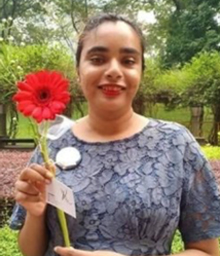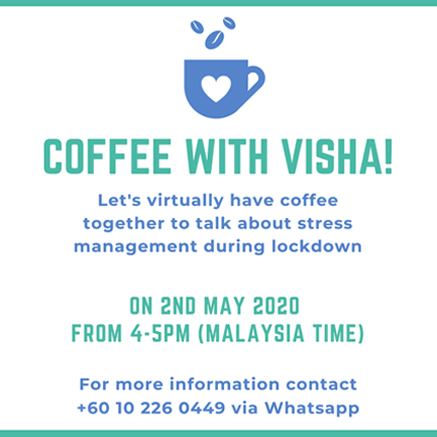
In a previous post about taking care of your mental health during #covid19 (you can read that here) made me think of my sister in law. Vishalatchi Arunagiri, or as we call her, Achu, was diagnosed with #schizophrenia in 2011. She is happy to share her story to raise more awareness about #mentalillness and tell us how she has been coping with #covid19.
Before we get started on the interview, let’s look at a detailed definition of the condition by the Mayo Clinic: Schizophrenia is a serious mental disorder in which people interpret reality abnormally. Schizophrenia involves a range of problems with thinking (cognition), behavior and emotions. Signs and symptoms may vary, but usually involve delusions, hallucinations or disorganized speech, and reflect an impaired ability to function. Symptoms may include:
- These are false beliefs that are not based in reality. For example, you think that you’re being harmed or harassed; certain gestures or comments are directed at you; you have exceptional ability or fame; another person is in love with you; or a major catastrophe is about to occur. Delusions occur in most people with schizophrenia.
- These usually involve seeing or hearing things that don’t exist. Yet for the person with schizophrenia, they have the full force and impact of a normal experience. Hallucinations can be in any of the senses, but hearing voices is the most common hallucination.
- Disorganized thinking (speech). Disorganized thinking is inferred from disorganized speech. Effective communication can be impaired, and answers to questions may be partially or completely unrelated. Rarely, speech may include putting together meaningless words that can’t be understood, sometimes known as word salad.
- Extremely disorganized or abnormal motor behavior. This may show in a number of ways, from childlike silliness to unpredictable agitation. Behavior isn’t focused on a goal, so it’s hard to do tasks. Behavior can include resistance to instructions, inappropriate or bizarre posture, a complete lack of response, or useless and excessive movement.
- Negative symptoms. This refers to reduced or lack of ability to function normally. For example, the person may neglect personal hygiene or appear to lack emotion (doesn’t make eye contact, doesn’t change facial expressions or speaks in a monotone). Also, the person may lose interest in everyday activities, socially withdraw or lack the ability to experience pleasure.

Symptoms can vary in type and severity over time, with periods of worsening and remission of symptoms. Some symptoms may always be present.
Achu, can you tell us a bit about your journey with schizophrenia?
My first episode was when I moved back to Kuala Lumpur. My mind was playing games with me. Once I even got lost and a stranger picked me up and brought me home. My mom took me to a psychiatrist and we discovered that I have a mental illness. I’ve been fighting for 9 years now and although I still struggle with the illness today, I have been able to write 2 books, pieces in magazines, be interviewed for newspapers, appeared on TV, and even started my own small business in Malaysia. You can read more about my journey here.
You’ve had some great progress over the years! Can you share with us more about your business?
I have a passion for making fresh floral design, and I started lessons at Lee Flower Design Academy two years ago. I have been in competitions and I started independently selling to select customers. I would like to pursue this passion a therapy to heal my inner consciousness and find solace while creating different color combinations. I am also passionate about advocating mental health awareness. I have created Vishalatchi Floral, a social enterprise to help by using flower designs to help empower other people who have a mental illness. Mind Voice is another initiative I started to contribute to the advocacy work that I want to continue doing.
Tell us more about the advocacy work that you do.
I am a peer support leader at the Malaysian Mental Health Association (MMHA). I created fliers to offer mental health sharing sessions open to the public. I led my first mental health talk in 2013 in General Hospital Klang. Then I shared my story in 2014 in MMHA where I’ve been a member for 6 years now. I led talks in Segi, a university in Malaysia. Furthermore, I participated in a charity dinner by MMHA to share my story. I have been interviewed by The Star Newspaper (link here) and my story is on the National Alliance on Mental Illness (NAMI) website (link here). I appeared once on Astro TV live in 2016 to share my story as well. I was a panel speaker at the Mental Illness Awareness & Support Association (MIASA) conference. I am hosting a talk on zoom this Saturday, May 2nd to have a chat about managing stress during lockdown. Contact me via Whatsapp for more information on how to join!

It’s wonderful to see your progress over the years, and I’m so glad that you are willing to share your story for further advocacy.
Now can you tell us, as someone with schizophrenia how have you been handling anxiety related to covid19?
It was scary to see the numbers increasing. I am scared of getting sick, so I keep washing my hands with soap. And at the same time, I also hear less voices. No paranoia of being kidnapped or abandoned so I feel relaxed and safe. These are the constant emotions and states of mind that I go through on a daily basis as someone with schizophrenia. During the past few weeks of when the country has been in a lockdown, I’ve had good moments and scary moments. Let me share some with you to give you an idea.
Sometimes I get scared when the phone rings and I think that maybe somebody passed away. People still walk around like normal, but I got my mask ready and I had to stay at home when my mother went for grocery shopping as only one person could go. The perks of being someone who is always paranoid is that we are always ready during a crisis. It’s been a long time since I’ve been left alone at home and it made me feel stronger.
I was relaxing on the couch waiting for my mother to come home when I began to get worried that this laziness was going to last too long, and I’ll become immune to staying at home and doing nothing. So, I started planning things to do, such as cooking, mopping, cleaning tables, washing dishes, social media, writing and watching TV. I cannot read books because the voices interrupt me.
During this COVID-19 lockdown, we have stocked up food for two weeks and medication for one month. I started having nightmares and strange dreams which would wake me up in the middle of the night. I’m scared my mother will not be around one day and I’ll be stuck alone in this country. I won’t be able to escape and save myself by going aboard. My voices told me that my family and relatives have all left. But yesterday I did a video with my family and they were all where they usually are. Same place and same country. My siblings all live abroad so it was a happy feeling talking to them. When they are so far away from home I feel worried. The COVID-19 lockdown made us all have time to speak together and through video chat, so I can see all of them, which helps with my worries. It’s important for family members to reach out to the people with a mental illness as we need each other now more than ever.
I’m glad I have my mother with me during this crisis. I would have died of boredom otherwise! I am lucky to have home cooked food and I am happy to find some work to do online with my NGO. I am confident that the virus will spread a lot more and I’m concerned that we will never be able to leave the house. What if we need food? But the government is giving money. I am happy to hear that as in crisis like this, we can’t work.
I hope people will read this story and get a small idea of the daily rollercoaster that I go through as someone who is trying to manage just like everyone else during these uncertain times, except I have voices and delusions to add a little color to these experiences!
Thank you so much for sharing Achu, I am sure this will help anyone else that’s battling #mentalillness through #covid19.
Information compiled by Devi Bajaj
Founder & Director of Enliven Concierge
Below are links related to schizophrenia and managing covid with a mental illness:
- Mayo Clinic – Schizophrenia
- Lee Flower Design Academy
- Malaysian Mental Health Association
- Challenges Media
- Voices of Youth
- Behaviorism and Mental Health
- NAMI Covid 19 Guide
- Rethink Mental Illness: Covid 19 Support
- WHO: Mental Health and Covid-19
- The Implications of COVID-19 for Mental Health and Substance Use